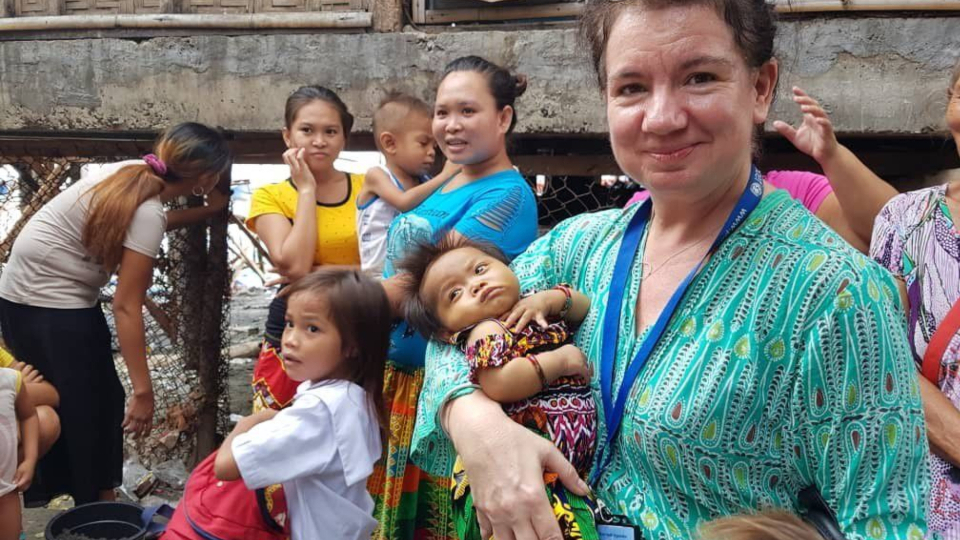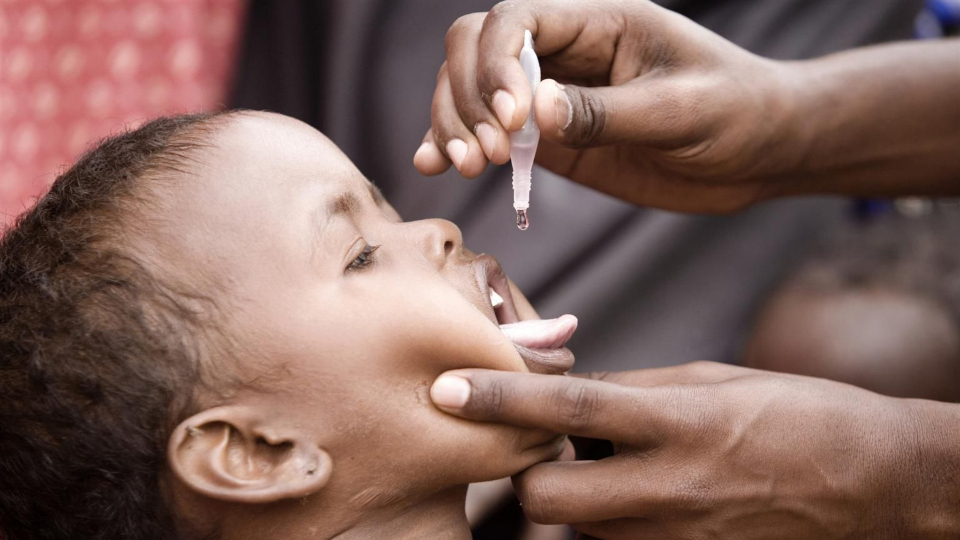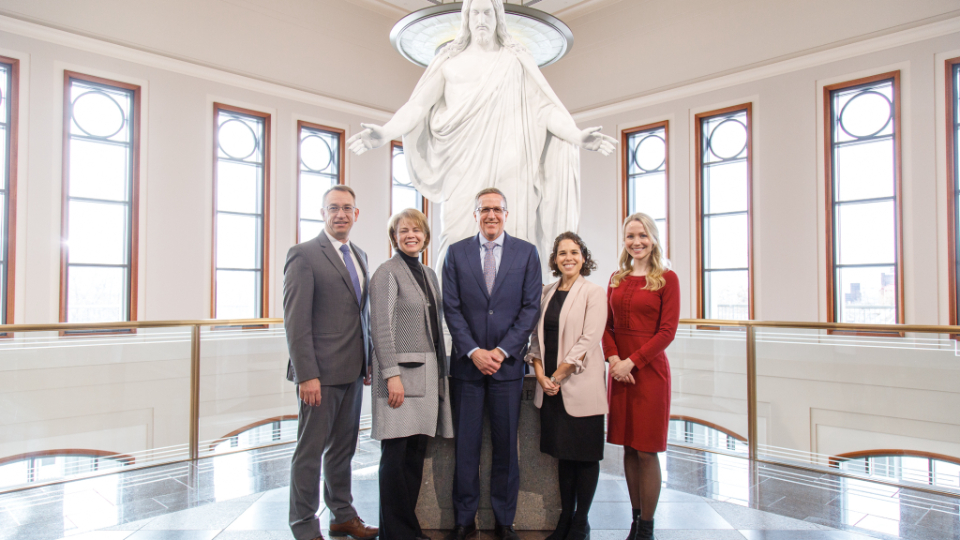
Polio
Melissa Corkum, senior manager for polio outbreak response with UNICEF, holds a baby in the field. She led UNICEF polio efforts in Afghanistan, Nigeria and Pakistan, and she spoke to the Church News about the role of female vaccinators in fighting polio. Photo courtesy of UNICEF, courtesy of Church News.All rights reserved.By Mary Richards, Church News
In many countries, health workers go village to village and walk house to house to give more children lifesaving immunizations.
But male vaccination teams often are not allowed into homes, because of religious and cultural norms in some areas. That is why female vaccinators are making much more progress — many are also mothers themselves and are able to connect and communicate with other mothers and caregivers in the households.
“It’s made a massive difference in the global fight to end polio,” said Melissa Corkum, the senior manager for polio outbreak response with UNICEF.
For example, a network of social mobilizers — made up of 90% women from local communities — worked to vaccinate more than 170 million children under age 5 in India, helping the country eradicate polio in 2014.
Then in Nigeria, the volunteer community mobilizers — over 80% of whom were women — helped build trust in the polio vaccine in high-risk areas, leading that country to be certified wild polio-free in 2020.
Now, as UNICEF continues polio vaccination efforts in Pakistan and Afghanistan, women community mobilizers and vaccinators are leading the charge against the disease.
“The only way to tighten the gaps in our system is by involving and empowering women equally in all elements and roles across the program,” Corkum said.

Polio
A child receives a dose of oral polio vaccine during a UNICEF-supported measles and polio immunization campaign. Photo courtesy of UNICEF/Modola, Rotary International, courtesy of Church News.All rights reserved.
Challenges in Pakistan and Afghanistan
Afghanistan and Pakistan are the only two countries where wild poliovirus is still transmitted persistently.
Before joining the outbreak team, Corkum led the UNICEF polio efforts in those countries. She said UNICEF helps vaccinate over 400 million children against polio every year — and it takes a lot of detailed planning at many different levels, from procuring and distributing to safely storing the vaccine to delivering the drops into the mouth of a child.
“A substantial part of our work — which in fact is the first critical step to achieving high vaccination coverage — goes into building trust in vaccines in communities,” Corkum said.
Health workers and mobilizers work with local politicians, tribal elders, traditional and religious leaders, polio survivors, educators, health care institutions and the media to provide accurate and timely information.
In Afghanistan, immunity gaps resulting from years of insecurity, missed vaccines or undervaccinated communities have left children at high risk for polio and other preventable diseases, said Corkum. And in Pakistan, existing challenges were exacerbated by the COVID-19 pandemic, record flooding and low routine immunization coverage in some areas.
Humanitarian crises, displacement and vaccine misinformation are causing a decline in childhood vaccination — leading to a spike in polio outbreaks, even in countries that had been polio free for decades.
UNICEF and partners, including Rotary International, are working on more focused campaigns and using available opportunities to enable health workers to reach children.
“While we are striving to end polio transmission in the last two endemic countries, we remain just as focused and committed to stopping variant polio outbreaks across Africa and Asia that have paralyzed over 2,000 children in the past four years,” Corkum said.
How the Church Is Helping to Fight Polio
In December 2022, The Church of Jesus Christ of Latter-day Saints gave $10 million to UNICEF and Rotary International to help them with immunization efforts and campaigns in 2023.

UNICEF-President-HQ-Tour-2023
UNICEF USA leaders stand with Church humanitarian representatives in front of a Christus statue on display in the Church's Conference Center in Salt Lake City, Utah, on Thursday, January 12, 2023. Pictured from left to right: Robert Hokanson, senior manager, Humanitarian Services; Sharon Eubank, director, Humanitarian Services; Michael Nyenhuis, president and CEO of UNICEF USA; Rachel Steinberg, managing director, UNICEF USA; and Sarah Callaway, assistant director, UNICEF USA. 2023 by Intellectual Reserve, Inc. All rights reserved.
And the Church has helped in the past, Corkum said. In 2015 and 2017, Church funding helped UNICEF procure and deliver polio vaccines to stop outbreaks in Mali and Guinea. In 2022, when the wild poliovirus reemerged in Malawi after more than three decades, the Church stepped forward to help UNICEF and the Ministry of Health expand the workforce of vaccinators and establish emergency operation centers across the country.
The emergency operation centers bring experts and partners under one roof, increasing coordination, efficiency and effectiveness to support health workers in the communities.
In addition, the Church is contributing to protecting children from other vaccine-preventable diseases by helping provide routine immunization services for children at specific sites during national polio campaigns, Corkum said.
Rachel Steinberg, the managing director for global cause partnerships with UNICEF USA, has led the partnership with the Church for the last 10 years.
“We are grateful that the Church has been a strong partner to UNICEF in support of immunization programs for many years,” Steinberg said. “The Church has provided support not only for long-term, sustainable programming that improves access to vaccines and builds better cold chain systems for vaccine delivery, but it has also generously stepped up in response to emergency outbreaks.”
Funding, which helps respond to emergency outbreaks and reach difficult-to-reach children, isn’t the only way the Church is helping UNICEF, explained Steinberg.
“Beyond this, Church leaders and members also use their voices to raise awareness of the importance of vaccines and advocate for increasing access to vaccines and for strengthening systems to serve underreached communities,” she said. “The trusted voices of faith communities and leaders are critical in these types of messaging efforts.”
Copyright 2023 Deseret News Publishing Company.